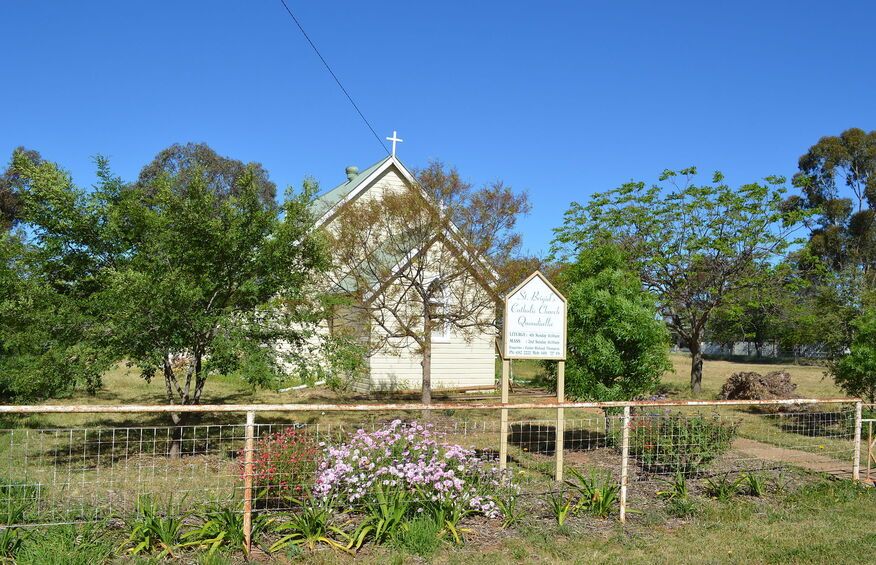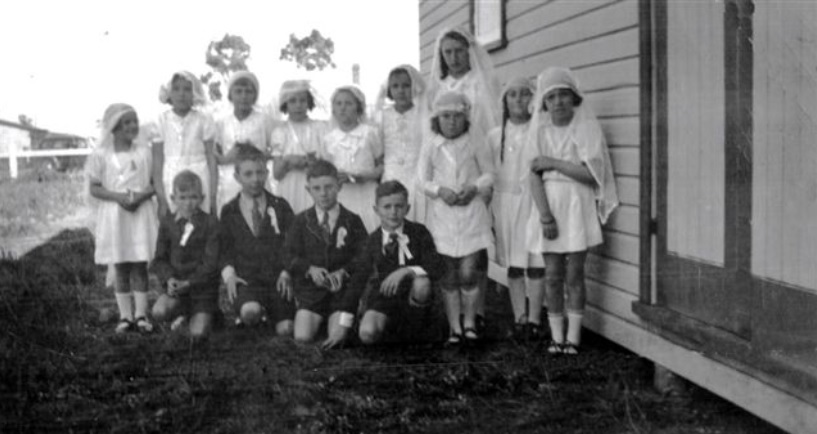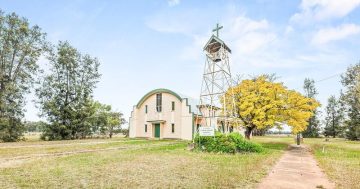
The community of Quandialla has been shocked at suggestions St Brigid’s Catholic Church will be sold. Image: Churches Australia.
A tiny weatherboard church built on the western fringes of the Hilltops region in 1924 on land donated by locals, using local timber cut and milled by locals, furnished using donations from locals and maintained for almost 100 years – yes, by locals – now looks likely to be sold by the Catholic Church.
Not that the locals knew.
So brief a sentence, it was almost a footnote among the abundant Christmas messages in the final 2024 edition of Quandialla’s newsletter Idle Chatter, but there was nothing nebulous about it.
“There will be a similar gathering at a later date, when arrangements are made for the sale of the Quandialla Church.”
This from St Mary’s, Young parish priest Father Jiss in an update on another village church – St Columba’s, Bribbaree – also to be sold, with the “Last Supper Mass” on 27 December.
In Quandialla there will be no white flag waved; St Brigid’s is their church, they built it.
Apathy on the part of the parish, they maintain, is responsible for withering numbers at St Brigid’s.
Parishioner Lucy Nowlan Kemp says people left the congregation once St Mary’s stopped sending out a priest from Young – a 46-minute trip.
“Back then it was sold to us to keep the church going by training lay people to do the liturgy, which we did,” she said, “and it got to the point where we were operating without priests, because none of them would come out.”
But, Lucy said, Canberra Goulburn Archdiocese Archbishop Christopher Prowse put a stop to that.
“He said it should stop because it wasn’t encouraging community-involved religious faith, would you believe?” she said.

First Communion at St Brigid’s in the 1940s. Image: Donna Slade.
“This is supposed to be a Christian religion that’s community-based,” she said, “but in the end people just lost faith and left.”
In 2014 as Quandialla celebrated its centenary, according to Lucy, Young Parish priest Father Tom Thornton declined the invitation to celebrate mass at St Brigid’s in favour of attending an NRL grand final.
“A former priest offered to come back and celebrate the mass and the church was full,” she said. “It was one of the biggest weekends in the village’s history.”
Then the church locks were changed. “I think they were a bit miffed it had been such a success,” Lucy said.
St Brigid’s use finally diminished to small gatherings with a local Extraordinary Minister of the Eucharist presiding each Sunday.
When the church floor was deemed unsafe, local efforts raised around $30,000, with families physically pitching in to finish that job.
“We got no help from the Church,” Lucy said.
St Brigid’s was used this year for a funeral. The building had to be cleaned out after recent flooding but was packed to the rafters.
“There’s a lot of community spirit out here but it’s been repeatedly quashed as the Archdiocese keeps shutting the door in our face,” Lucy said.
“I think the intention is to completely disempower; to divide and conquer, throw all this stuff at us and finally wear us down.
“Sell the block next door, but don’t sell the church, we still want the church.”
Archdiocesan Vicar General Father Richard Thompson said it was unfortunate Father Jiss ‘floated’ the future of St Brigid’s in a recent parish bulletin.
“That was a crystal balling thought bubble I suspect,” he said, adding there had been no presentation of any issue concerning the church’s future to the Trustees of the Archdiocese.
“All our churches need to be maintained and this is not possible with many because of the decline in parishioners, including the town of Bribbaree,” he said.
“The grounds may be maintained by the community, but any building maintenance and all insurances have to be paid for by the parish,” Fr Thompson said.
He said he appreciated that local communities were passionate about their heritage, not just their churches.
“If the parishioner numbers and the finances were consistent, then we would not be having this conversation, a conversation the Archdiocese has had to have and will be having with other declining Catholic communities, and not just rural,” Fr Thompson said.
He said there was no question the proceeds of sale of either property would be used to pay reparation to victims of abuse.
“We take that responsibility very seriously,” he said. “The parishes of the Archdiocese of Canberra and Goulburn have never been asked to pay any of this cost. The Archdiocese pays the costs through other means. The parishes would never be able to cover those costs.”








